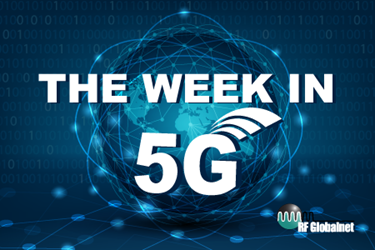The Week in 5G: 5/19/2020 — Cell Tower Attacks Come to US; Verizon Called Out for Misinformation in Ads
By Ed Biller

In network rollout news, China Telecom and China Unicom will deploy Ericsson Radio System products and solutions, including Ericsson Spectrum Sharing, as they roll out 5G across China, states an Ericsson press release.
“Ericsson will provide outdoor and indoor site solutions to build capacity and coverage in the 3.5 GHz and 2.1 GHz bands,” the release states.
Meanwhile, at the Beijing Economic-Technological Development Area — where China's first 5G smart construction site is located — more than 40 enterprises are upgrading their smart manufacturing facilities based on 5G network, reports China Global Television Network (CGTN).
The site is attempting to maximize efficiency and worker safety using 5G AI glasses, a “health analysis system” that determines employees’ fitness for work, and enhanced security monitoring.
Also in China, Huawei will add a new device to its Enjoy series (likely a budget offering) with the upcoming Enjoy Z 5G slated for a May 24 release, reports GSMArena.com. The report speculates the Enjoy Z 5G will be equipped with the MediaTek Dimensity 800 chipset.
In the United States, the Department of Homeland Security (DHS) "is preparing to advise the US telecom industry on steps it can take to prevent attacks on 5G cell towers following a rash of incidents in Western Europe fueled by the false claim that the technology spreads the pathogen causing COVID-19," reports The Washington Post (via Ars Technica). The report states that DHS already has recorded "arson and physical attacks against cell towers in several US states."
DHS also reportedly provided an intelligence report on the issue to senior federal officials and law enforcement agencies around the nation. Ignorance on how illnesses actually spread and deliberate “misinformation campaigns” have driven the destructive activity, the report allegedly states.
In “pot calling the kettle black” news, Verizon in the US has been found guilty — by BBB National Programs and its National Advertising Division (NAD) — of misrepresenting the "power" of its mmWave-based 5G network in two TV commercials. AT&T filed the initial complaint less than a year after it raised a stink by deceptively rebranding its LTE Advanced service as 5G Evolution.
Verizon does not plan to fight the allegations, reports PhoneArena.
On the heels of last week’s scathing TechDirt article on the U.S.’ floundering 5G efforts, the Federal Communications Commission (FCC) has proposed a $9 billion Rural 5G Fund that aims to “help ensure that rural Americans enjoy the same benefits from our increasingly digital economy as their urban counterparts,” reports RCR Wireless.
The Rural 5G Fund would “repurpose” money from the now-defunct Mobility Fund II program with a pre-auction phase and two auctions. Per RCR Wireless, the FCC would first create a 5G Small Carrier Fund that offers up to $2 billion over a 10-year period “to current legacy support recipients which have 500,000 or fewer subscribers.”
The report continues, “the first auction would be a $5 billion reverse auction, tentatively scheduled for 2021, for the small-to-midsized RUCAs not being served through the 5G Small Carrier Fund. The second, proposed for 2024, would disperse the remaining $2 billion in ‘eligible markets’ as determined by which areas are being served as a result of the first two phases, plus … coverage data from the FCC’s Digital Opportunity Data Collection program and ‘T-Mobile’s merger specific rural 5G build out commitments.’”
Still, the FCC is “at war” with the US Department of Defense (DoD) over freeing up spectrum, reports Multichannel News. The report states that Republican FCC commissioner Michael O’Rielly attempted to convince President Trump in a letter last month that evidence indicates redistribution of spectrum does not endanger national defense.
Per the Multichannel News report, “O’Rielly [suggested] DOD had become the Department of Spectrum Defense, saying it was ‘exceptionally reluctant to part with one single megahertz. Simply put, every excuse, delay tactic and political chit is used to prevent the repurposing of any spectrum.’”
Finally, the US and Japan reportedly are “holding a dialogue on economic security for discussing concrete measures to secure a safe 5G-based communications network and manage the export of advanced civilian technology that can be also used for military purposes,” states a Business NewsUpdate article.
The article adds that Japan and the US also are discussing “management of inward direct investment and export controls, and the management of foreign students at Japanese research institutes and universities.”
